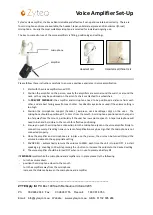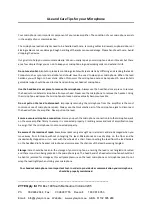
__________________________________________________________
ZYTEQ pty ltd
PO Box 190South Melbourne Victoria 3205
Ph:
03 9696 2944 Fax:
03 9696 1755 Freecall: 1800 818 353
Email: info@zyteq.com.au Website: www.zyteq.com.au A.B.N. 81132 895 268
Use and Care Tips for your Microphone
Your microphone is an important component of your voice amplifier. The condition of your microphone assists
in the quality of your communication.
The microphone leads and jacks need to be handled with care. Jamming cables in drawers, cupboard doors or
kinking cables can cause damage. Rough handling of the jacks can cause damage. Please handle with care. Avoid
dropping the device.
Our goal is to help you communicate clearly. We can usually repair your microphone when it breaks but there
are a few simple things you can do to keep your microphone in good working order and extend its life.
Do not use alcohol.
Alcohol or products containing alcohol will create static by stiffening and cracking the leads.
Products such as Lysol contain alcohol and should never be used to clean your microphone. When the lead
hardens you will begin to hear static. When this occurs the microphone cannot be repaired. A non-alcoholic
germicidal wipe should be used to clean and sanitize your headset microphone.
Use the headband or ear piece to remove the microphone.
Always use the headband or ear piece to remove
the headset or unilateral microphone from your head. Never use the microphone to remove the headset. Using
the microphone will cause the microphone to loosen and eventually become unusable.
Do not pull on the lead to disconnect.
Improperly removing the microphone from the amplifier is the most
common cause of microphone repairs. Always use the thick plastic part of the microphone jack to disconnect
the headset from the amplifier. Never pull on the lead.
Ensure a secure microphone connection.
Ensure you push the microphone connection into the microphone jack
on the voice amplifier firmly to ensure it is connected properly. Crackling noises and lack of amplification may
be a sign that the microphone is not connected properly.
Be aware of the location of leads:
Sometimes leads can get caught up in armrests and are damaged when you
move away from furniture without untangling the lead. Microphones can easily drop on the floor and be
inadvertently stepped on or run over with the wheels of a chair. Disconnecting the lead from the lead holders
on the headband (of a headset microphone) also increases the chances of the lead becoming tangled.
Storage:
Care should be taken in the storage of your microphone, ensuring the lead is not tangled or knotted
and there is no strain being placed on the microphone jack. The head band of a headset microphone should not
be bent or jammed for storage as this will place pressure on the lead, microphone or microphone jack. Do not
wrap the lead tightly when storing your microphone.
Your headset microphone is an important tool. In order to provide clear communication your microphone
should be properly maintained
.




















